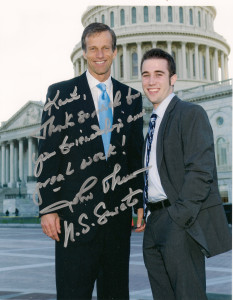 My interest in politics began in 2000 when my father taught me how the Electoral College worked for electing a president. I was a young teenager but my interest in politics, like my awareness of the world, grew. We had our guy in the White House and they didn’t. Our nation went off to war and we had to support the troops, no matter the circumstances (it seemed). Simply put, Republicans could do no wrong.
My interest in politics began in 2000 when my father taught me how the Electoral College worked for electing a president. I was a young teenager but my interest in politics, like my awareness of the world, grew. We had our guy in the White House and they didn’t. Our nation went off to war and we had to support the troops, no matter the circumstances (it seemed). Simply put, Republicans could do no wrong.
As a millennial who grew up in a conservative home, I am sympathetic to some of the experiences that Susie Meister had. In her article, “Why I Left the Right: How Studying Religion Made Me a Liberal,” she describes how her experiences in life led her to abandon her evangelical worldview and in turn her political views.
Politics wasn’t my only interest in high school. I began to ask the deep questions of life such as ‘Where did we come from?’ and ‘Why are we here?’ I never forsook my faith like some do in their doubting season, but I began to explore alternative worldviews to understanding the world around us. The more I read, thought, and conversed with others, the more I realized that the meta-story we’re told about in the Bible reliably reflects reality.
Interestingly enough, as Meister had “a shift in [her] understanding of Scripture” I had a confirmation in my understanding of Scripture: That it is the Word of God. While she believes that she could “read the text through unfiltered eyes,” I learned that we all approach reading Scripture through some sort of hermeneutical lens or historical methodological presupposition.[1]
Meister’s shift on the text led to a shift in her understanding of Jesus’s teachings. Her worldview fell “apart like a house of cards” and she could “no longer reconcile Jesus’s calls for non-judgment, loving your enemies, and taking up your cross with many of the Religious Right’s positions on social services, women’s rights, and the LGBT community.” I’m not sure which Gospel she is interpreting when she makes those remarks, but it seems to me that Jesus’s teaching against prejudice in his Jewish milieu is not an endorsement of moral relativism or sexual perversion. Indeed, the Gospels present to us a picture of God in the flesh who makes known his impending Kingdom of love and grace but also of truth and justice wherein the hungry are fed and the sick are healed, but also that he is the Messiah and that it would be better for people to commit suicide or dismember a hand or foot than to sin.
It is a big stretch to think that Jesus, if he were walking the Earth today in the same manner he had back then, would teach that women should kill their children or that sexually confused people should behave in a way that indulges the desires of the flesh. To the contrary, if Jesus is God then he had taught the Israelites that it is wrong to murder your children (especially to pagan gods/idols) and that sexual perversion is not part of the human telos. Indeed, Jesus confirms these teachings when he said “Let the little children come to me, and do not hinder them for the kingdom of heaven belongs to such as these” (Mark 10:14) and that the male-female relationship in the bond of marriage is the foundation for sexual ethics (Mark 10:6-9). The early church explicitly confirms these oral teachings in the epistles of the New Testament.
One of the most disheartening features to Meister’s story, and an aspect common to many people, is the lack of consideration given to the great question, ‘What is the proper role of government?’ For although Jesus teaches us to feed the hungry, he never says that the Roman government should do it. Granted, we live in a different type of society where we are voters in what the government should do, but these sort of questions are more difficult than merely plucking one teaching from Jesus and using it to defend some stretched notion about how the government create some program or spend billions and trillions of dollars. Jesus didn’t even want to make a decision as to how to divide an inheritance when he responded to such a request in Luke 12, “Man, who appointed me a judge or an arbiter between you?” And much to the dismay of Bernie Sanders supporters, Jesus warns: “Take care, and be on your guard against all covetousness, for one’s life does not consist in the abundance of government programs” (or something like that).
 Meister is correct that Jesus encouraged some of his followers to sell their possessions and give to the poor. But her implied conclusion (that we should have the government give to the poor) is a textbook example of a non sequitur. These instructions require an individual to make that choice; when the government places a tax upon a person it is done through coercion of the state and not a free choice out of the kindness of one’s heart. While she thinks “the lifestyle of Jesus didn’t look anything like the politics of the Right” I’m not convinced his lifestyle looked much like the Left, either. Some studies have shown that despite being more vocal about government programs, those on the Left give less to charitable causes than the Right.[2] An inspiring teacher once said, “For they preach, but do not practice.”
Meister is correct that Jesus encouraged some of his followers to sell their possessions and give to the poor. But her implied conclusion (that we should have the government give to the poor) is a textbook example of a non sequitur. These instructions require an individual to make that choice; when the government places a tax upon a person it is done through coercion of the state and not a free choice out of the kindness of one’s heart. While she thinks “the lifestyle of Jesus didn’t look anything like the politics of the Right” I’m not convinced his lifestyle looked much like the Left, either. Some studies have shown that despite being more vocal about government programs, those on the Left give less to charitable causes than the Right.[2] An inspiring teacher once said, “For they preach, but do not practice.”
If there is anything we can learn from Meister it is two things. First, her experience tells us that we Christians are not doing a good enough job at interacting with non-Christians. We need to do a better job of meeting people where they are at in life. Invite non-believers over to dinner, talk with a Muslim, and show a certain level of respect to people with homosexual attraction. We can’t socially ostracize people that are different than us; we need to reach out to them and invite them into the life of the Kingdom, just as Jesus had done. Of course, this is to say nothing at all about political theory or macroeconomics. Second, her story confirms to all that a departure from the evangelical interpretation of Scripture lends itself toward the departure of a socially and fiscally conservative political philosophy. If she wants to win over evangelicals to become liberals, she requires that they abandon their evangelical faith in order to do so.
[1] “Important Considerations on Historical Inquiry Pertaining to the Truth in Ancient Text,” in The Resurrection of Jesus: A New Historiographical Approach by Michael R. Licona (Downers Grove: IVP Academic, 2010), pages 29-132
[2] Nicholas Kristof, “Bleeding Heart Tightwads,” http://www.nytimes.com/2008/12/21/opinion/21kristof.html?_r=0

Comments